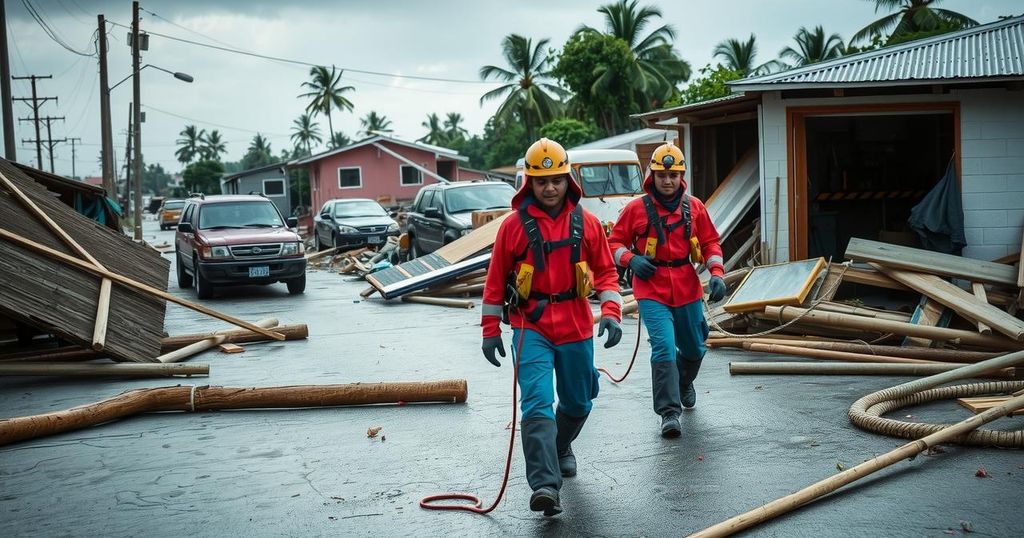World news
AFRICA, BFM - TV, EMERGENCY RELIEF, EMERGENCY RESPONSE, EUROPE, FRANCE, FRANCOIS - XAVIER BIEUVILLE, FRENCH RED CROSS, GENEVIÈVE DARRIEUSSECQ, GENEVIEVE DARRIEUSSECQ, INDIAN OCEAN, MAYOTTE, MAYOTTE LA 1ERE, NATURAL DISASTER, NATURAL DISASTERS, PARIS, REUNION, SAL, SALAMA RAMIA, UK
Marisol Gonzalez
0 Comments
Cyclone Chido Devastates Mayotte: Rescue Operations Underway Amidst Humanitarian Crisis
Cyclone Chido has devastated Mayotte with winds over 124 mph, causing significant loss of life and ongoing shortages of food and water. Rescue efforts face challenges due to extensive damage to infrastructure, while emergency aid is urgently needed. The situation raises alarms about humanitarian needs, particularly for vulnerable populations in the region.
Rescue operations are currently underway on the island of Mayotte following the devastating impact of Cyclone Chido, which generated winds exceeding 124 miles per hour. Local authorities estimate that the cyclone has claimed at least 20 lives, but higher death tolls may emerge, potentially rising into the hundreds or even thousands due to the severe destruction inflicted. The Prefect of Mayotte, Francois-Xavier Bieuville, indicated that accurately determining the number of casualties is extremely challenging given the circumstances.
The French Red Cross has labeled the aftermath of the cyclone as “unimaginable,” with aid shipments of over 20 tons—including essential supplies like drinking water and hygiene kits—being dispatched from Reunion. Efforts to reach those affected have been impeded by widespread damage to infrastructure, with military vehicles being deployed to clear roadways for emergency personnel. Notably, Mayotte’s primary hospital and its only airport sustained significant damage during the cyclone, limiting access to essential services.
Many residents are grappling with severe shortages of clean drinking water and electricity. Senator Salama Ramia has urgently called for increased aid, emphasizing that “there’s no water, no electricity,” and articulated growing concerns regarding hunger, particularly among vulnerable populations such as children. Eyewitness accounts from residents reveal a landscape of devastation, with one local stating, “It really is a war landscape,” reflecting the transformative damage caused to the island’s natural environment.
Cyclone Chido is characterized as the most powerful to strike Mayotte in nearly a century, having also affected neighboring regions including the Comoros, Madagascar, and Mozambique. While the cyclone has weakened after making landfall in Mozambique, where reports indicate three fatalities, humanitarian organizations warn that over two million individuals are potentially impacted by its aftermath. In light of the tragedy, French President Emmanuel Macron convened an emergency meeting and declared a national day of mourning, expressing plans to visit Mayotte in a show of solidarity with the affected communities.
Cyclone Chido, recognized as a tropical cyclone, swiftly moved across the Indian Ocean, wreaking havoc on the archipelago of Mayotte, which is France’s poorest territory. Tropical cyclones are categorized by varying nomenclatures depending on their geographical locations; in this instance, they are referred to as cyclones in the Indian Ocean. The storm’s violent winds and accompanying rains are known to cause extensive destruction, loss of life, and significant challenges for emergency response teams, especially in regions lacking robust infrastructure. Mayotte has experienced harsh weather patterns previously, but the severity of Cyclone Chido marks an unprecedented event in recent history, emphasizing the island’s vulnerability to extreme weather phenomena, a situation exacerbated by climate change.
In conclusion, Cyclone Chido has resulted in catastrophic destruction across Mayotte, with substantial loss of life and severe shortages of vital resources such as water and electricity. The humanitarian response is ongoing, although access to affected areas remains a significant challenge due to the destruction of infrastructure. The situation highlights the critical need for urgent aid to support recovery efforts and address the immediate needs of the population, particularly the most vulnerable groups. As recovery efforts continue, solidarity from both national and international actors will be essential in rebuilding and providing relief to the region.
Original Source: news.sky.com




Post Comment